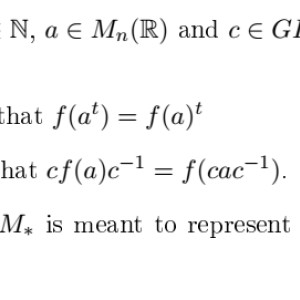Conjugate / Transpose - Matrix
I would apreciate an detalied soultion. I know it isn't a hard exercise, but I tend to make mistakes and not see them. I honetly fear the possible losing of points. Therefore I am now asking you for help.
Honestly tank you.
Answer
1. We will use the following two properties of the tranpose:
(i) Linearity: For all $r\in \Bbb R$, $x,y\in M_n(\Bbb R)$ one has $(rx+y)^t= rx^t+y^t$.
(ii) Anti-multiplicativity: For all $x,y\in M_n(\Bbb R)$ one has $(xy)^t=y^tx^t$.
We use (ii) to get:
(iii) For all $x\in M_n(\Bbb R)$, $k\in\Bbb N$ one has $(x^k)^t= (x^t)^k$.
As a proof we do induction over $k$. Its obviously true for $k=0$ (remember that $x^0$ is the identity matrix), so for the induction step we assume it holds for a $k$, then:
$$(x^{k+1})^t = (x^k\cdot x)^t \overset{(ii)}= x^t(x^k)^t \overset{IH}= x^t (x^t)^k = (x^{t})^{k+1}$$
Now let $f[x]=\sum_{k=0}^N f_k\ x^k$ be a polynomial. By using (i) and (iii) we get:
$$f[a]^t = \left(\sum_{k=0}^Nf_k \ a^k\right)^t \overset{(i)}= \sum_{k=0}^N f_k\ (a^k)^t \overset{(iii)}= \sum_{k=0}^N f_k\ (a^t)^k = f[a^t]$$
2. The proof is the same. We have that conjugation is:
(i) Linear: For all $r\in \Bbb R$, $x,y\in M_n(\Bbb R)$ one has $c(rx+y)c^{-1}= r\,cxc^{-1} + cyc^{-1}$.
(ii) Multiplicative: For all $x,y\in M_n(\Bbb R)$ one has $c(xy)c^{-1}= (cxc^{-1})(cyc^{-1})$.
Then by doing the same induction proof as before you get:
(iii) For all $x\in M_n(\Bbb R), k\in\Bbb N$ one has $c(x^k)c^{-1}=(cxc^{-1})^k$.
So for a polynomial $f[x]$ you have:
$$cf[a]c^{-1} = c\left(\sum_{k=0}^Nf_k\ a^k\right)c^{-1}\overset{(i)}= \sum_{k=0}f_k \ (cx^kc^{-1}) \overset{(iii)}= \sum_{k=0}^N f_k (cac^{-1})^k = f[cac^{-1}]$$
3. Here we use the result from 2., remember that the minimal polynomial $M_x$ of $x\in M_{n}(\Bbb R)$ is the monic polynomial of minimal degree so that $M_x[x]=0$.
We will show that $M_a(cac^{-1})=0=M_{cac^{-1}}(a)$ and that $\deg(M_a)=\deg(M_{cac^{-1}})$. This implies that $M_a$ is a monic polynomial of with $M_a(cac^{-1})=0$ and whose degree is minimal among all polynomials $f$ for which $f(cac^{-1})=0$ - ie that $M_a$ is the minimal polynomial for $cac^{-1}$, meaning
$$M_a=M_{cac^{-1}}$$
Well one has:
$$M_a(cac^{-1}) \overset{2.}= cM_a(a)c^{-1}=c\cdot 0\cdot c^{-1}=0$$
This also implies $\deg(M_a)≥\deg(M_{cac^{-1}})$ as $M_{cac^{-1}}$ has minimal degree among all polynomials annihilating $cac^{-1}$. Similarly:
$$M_{cac^{-1}}(a) = c^{-1}(cM_{cac^{-1}}(a))c^{-1}c\overset{2.}= c^{-1}M_{cac^{-1}} (cac^{-1})c = c^{-1}0c =0$$
and one gets in the same fashion $\deg(M_{cac^{-1}})≥\deg(M_a)$.
 Dynkin
Dynkin
- answered
- 1826 views
- $15.00
Related Questions
- Determine and compute the elementary matrices: Linear Algebra
- Advice for proving existence claims
- [Linear Algebra] $T$-invariant subspace
- Stuck on this and need the answer for this problem at 6. Thanks
- Length of a matrix module
- Find a vector parametric form and symmetric form, find minimal distance betwen L and P, consider vectors v and w.
- [ eigenvalues and eigenvectors] Prove that (v1, v2, v3) is a basis of R^3
- Linear Algebra - Matrices and Inverses Matrices


Offer is way too low!
Thank you for informing me. Is it now acceptable? If not, what would be?